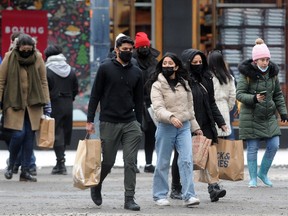Breadcrumb Trail Links
NewsLocal News
B.C. isn’t planning to remove its PST, so people in provinces with the HST will save a lot more
Article content
British Columbians will be saving less than many other Canadians with the federal government’s GST/HST tax break.
The holiday relief from federal sales tax, announced Thursday, applies to the GST or HST on grocery items, restaurant meals, some alcoholic beverages, children’s clothing and toys, print newspapers and Christmas trees from Dec. 14 to Feb. 15.
Advertisement 2
Article content
The tax break is expected to save Canadians about $1.6 billion over two months.
But British Columbians — who pay five per cent GST and seven per cent provincial sales tax at the till — are going to be saving only the GST on qualifying items while still paying the PST. Meanwhile, consumers in the five provinces that have an HST will save 13 or 15 per cent on their purchases.
The harmonized sales tax, or HST, is collected by the federal government, which then sends the provincial share to the respective provincial governments.
It would be up to the B.C. government to remove its PST if it chooses to do so.
Postmedia News reached out to Premier David Eby’s office to ask if the province plans to cut the PST over the holidays, but did not receive a response.
In a news release outlining the savings, the federal Finance Department said a family in B.C. who spent $2,000 on qualifying items would save about $100 over the two months.
But a family in Ontario that spent $2,000 on the same basket of goods would get about $260 in savings, more than double the B.C. tax break, because Ontario has a 13 per cent HST.
Article content
Advertisement 3
Article content
“The issue with the HST is that it would have been very difficult to only charge the provincial component,” said Steeve Mongrain, an economics professor at Simon Fraser University.
Instead, Ottawa would likely strike a deal with provinces with HST.
“In Ontario, for example, I don’t know what agreement they have. Would the federal government absorb and remit the provincial share to the province, or is the province willing to join in and face the fiscal burden of giving up the tax (revenue)?”
New Brunswick Premier Susan Holt appeared surprised by the federal announcement, telling CBC News the tax cut could cost her province $62 million in revenue. She said she expected Ottawa to “help keep us whole.”

Carson Binda, B.C. director with the Canadian Taxpayers Federation, said he believes the federal government will need to reimburse at least some of the provinces for lost HST revenue after examining its tax agreements with them. But B.C. would likely not be reimbursed if it removed its PST.
“That’s a problem because B.C. is the epicentre of the affordability crisis,” he said.
Advertisement 4
Article content
Five provinces in Canada use the HST — Ontario, Newfoundland, New Brunswick, Nova Scotia, and Prince Edward Island.
B.C. adopted the single-tax HST in 2010, but reverted to separate GST and PST three years later after a thin majority voted to scrap the HST in a binding provincewide referendum in 2011.
Binda said B.C.’s large deficit may have “eroded the province’s ability to be flexible to match the federal tax cut. Fiscal irresponsibility has consequences.”
He would rather have seen the federal government make permanent tax cuts, or halt expected tax increases, like the carbon tax increase.
“Tax cuts, not just temporary holidays, are the solution,” he said. “This is a Band-Aid.”
Prime Minister Justin Trudeau also announced Ottawa will be distributing a $250 cheque next spring to every Canadian who earned less than $150,000 a year. The rebate is expected to be distributed to 18.7 million Canadians before the next election.
The rebate makes better sense than the temporary GST/HST tax break, said Mongrain.
The tax break is difficult to retailers — who have to adjust till programming, among other things — and opens the door to tax evasion by shady businesses who may mislabel items. The selection of items that qualify for the tax break also seems arbitrary, he said.
Advertisement 5
Article content
“Garments are fine, but not things exclusively for sports. Beer under seven per cent is exempted, but not if it’s more than that. Wine is, but not spirits. I’d love to have been in that room when they were trying to decide what’s exempted.”
Many items that will receive a GST break are already exempt from B.C.’s PST, including books, newspapers, children’s clothing, child car seats and basic groceries, including restaurant meals, while others, like artificial Christmas trees and toys, are not.
The B.C. government has promised a $1,000 tax cut for the average family every year, starting with a direct rebate next year.

Greg Wilson, B.C. director of government relations for the Retail Council of Canada, said news of the tax holiday is generally positive because retail sales have been “a bit soft” in B.C. While numbers have been flat or slightly up in terms of dollar amounts, the number of transactions is down.
“If consumers have more money in their pockets, we look at that as a positive,” he said.
But the two-month GST exemption will create extra work for retailers, who must either take off the GST on all applicable items in the next three weeks, or pay the company that manages their point of sale system to do it, not just once, but twice, when GST needs to be added again in February. Large retailers typically schedule price changes months in advance, so the tax break will be a scramble at an already a busy time.
Advertisement 6
Article content
“But if consumers have more money to spend, how can retailers be upset?” he said.
Wilson said there will also be some quirks to work out, similar to those that already exist around PST exemptions. Food merchants will need to figure out which foods are snacks and which are staples, while liquor retailers will need to examine the alcohol content of individual types and brands of beer to see if they exceed seven per cent.
“There’s a lot of nuance,” he said. “It will be hard for small businesses that will need to do this themselves.”
Wilson said he would have preferred to tax cuts with a lasting impact. He also wondered if people would delay their Christmas shopping to avoid paying GST on some items and risk not being able to find them in stock after Dec. 15.
Mongrain said consumers will welcome the tax break during the holiday season, but he thinks the GST/HST break is more a political move than efficient economics. He said he’d have preferred seeing two rounds of the $250 rebate instead.
“This looks like a great thing, but what is it going to accomplish versus just sending a cheque to people?”
Recommended from Editorial

When will British Columbians get their NDP-promised $500 tax rebate?

B.C.’s movie and TV industry is struggling. Will a promised tax credit increase help?

Metro Vancouver approves 2025 budget with 10 per cent increase in taxes, fees
chchan@postmedia.com
gluymes@postmedia.com
Article content
Share this article in your social network

















.jpg&h=630&w=1200&q=75&v=20170226&c=1&w=120&resize=120,86&ssl=1)


